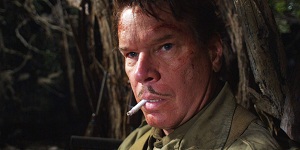Stuart:
A sci-fi World War II film set in Australia that features a crashed spaceship, time travel and the Gippsland phantom cat? Count me in!
A low budget, high ambition labour of love, The 25th Reich is a throwback to old school pulp fiction, 50s B-grade sci-fi and the type of film that might have had a trailer halfway through Tarantino and Rodriguez’s Grindhouse double feature. The film uses a myth that’s well known in regional Victoria as the narrative launching pad: during World War II, two pumas that were used as mascots have escaped a local US Army base, and a small group of men are dispatched to retrieve them. Lugging some high tech equipment in tow, tensions are already high amongst the soldiers, and before the movie is out, we’ll have seen them put through the wringer in a journey that spans 50,000 years.
In a refreshing change from Hollywood’s big budget output of late, the screenplay is the best part of The 25th Reich.  The five characters have real depth, and the dialogue – though occasionally hard to hear because of a multiplicity of genuine and attempted American accents – crackles throughout the film. The film actually tackles prejudice and extreme ideology head-on, and whilst I wouldn’t suggest that it’s a particularly philosophical movie experience, the script is much richer than I would have expected.
The five characters have real depth, and the dialogue – though occasionally hard to hear because of a multiplicity of genuine and attempted American accents – crackles throughout the film. The film actually tackles prejudice and extreme ideology head-on, and whilst I wouldn’t suggest that it’s a particularly philosophical movie experience, the script is much richer than I would have expected.
Jim Knobeloch is brilliant in the lead role. He plays Captain Donald O’Brian, a Hollywood star who has decided to do his part in helping the war effort. As such, he doesn’t have the respect of his men, apart from that of young Private Eli Ishback (Dan Balcaban), who hopes one day to make it in the movies. The rest of the crew have their own issues with each other, whilst Sergeant Carl Weaver (Serge De Nardo) is responsible for the piece of sci-fi equipment they’ve had to carry all the way into the bush with them.
The cinematography makes the most of the Victorian bushland, and as the film begins we’re treated to a nicely oversaturated image that boasts bold blue skies and bright green leaves. Once the freaky stuff started happening, however, I was disappointed to see that the images changed to a washed out blue. Being a low budget film, the visual effects were never going to set the world on fire, but they get the job done. The designs of the robots and the sci-fi vehicles, however, are fantastic. Ricky Edwards’ score, borrowing heavily from Holst’s ‘Mars, the God of War’ (and by extension, John Williams) is a real highlight.
Unsurprisingly, comparisons could be made between this and Iron Sky. Whilst the latter boasts a bigger budget and more impressive visuals, I actually prefer The 25th Reich because it knows what it wants to be. This is gratuitous b-grade fun, whereas Iron Sky tried to combine the same with a mostly failed attempt at witty satire.
The pacing could be better and there are a few too many ‘walking through non-specific bushland’ scenes. Also, it’s hard not to feel disappointed by the climax, which is a bit of a letdown after seeing all the pieces of the narrative fall into place. The credits tell us that a sequel awaits, and in the Q & A after the screening the filmmakers told us they were in the process of writing just that. I’ll be eager to see where the next instalment takes us, but in the meantime The 25th Reich is a gleefully mischievous, deliberately cheesy exploitative sci-fi that deserves your attention.
Rating: